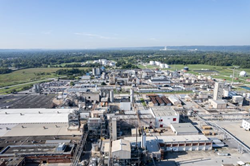
The Air Justice website will address environmental health disparities in the neighborhoods around the Rubbertown area of Louisville, Ky. (Photo: Dantana Smith/Cultivating Perceptions)
The Air Justice website decodes the science and health effects of air pollution, uncovers the history of environmental injustice …, amplifies residents’ stories related to air pollution, and directs residents to resources for reporting odors and pushing for increased air quality regulation.
LOUISVILLE, Ky. (PRWEB)
March 27, 2023
Members of the public soon will be able to access a new website aimed at improving environmental health equity in Louisville.
Supported by the University of Louisville, the Humana Foundation and the Health Equity Innovation Hub, the Air Justice website, http://www.airjusticelou.org, debuts at noon, March 28.
More than 50 UofL students have worked on the project since 2021 with a coalition that includes professors, community leaders and activists. The team conducted nearly 2,000 surveys around the Rubbertown area and also held workshops with residents to determine residents’ informational needs.
Rubbertown was named for the tire and synthetic rubber plants built there during World War II. Air quality in the area has suffered as a result. In west and southwest Louisville, the areas that border Rubbertown, residents are predominantly Black and other people of color, most of whom also experience poverty.
“The Air Justice team considers air quality an environmental health equity issue, one that has a lot to do with literacy or with how information about air quality is distributed in the city,” said Megan Poole, UofL assistant professor of English, College of Arts & Sciences. “The Air Justice website decodes the science and health effects of air pollution, uncovers the history of environmental injustice in West Louisville, amplifies residents’ stories related to air pollution, and directs residents to resources for reporting odors and pushing for increased air quality regulation.”
In addition to Poole and the students, the Environmental Health Literacy Coalition includes:
- Shavonnie Carthens, assistant professor of law, Louis D. Brandeis School of Law;
- Keisha Dorsey, who formerly represented Louisville Metro Council District 3, an area bordering Rubbertown, and is now deputy chief of staff to Louisville Mayor Craig Greenberg, and
- the grassroots activist group Rubbertown Emergency Action (REACT).
Human health risks associated with the chemicals released in the Rubbertown area are over 10,000 times higher than the industry average.
“Even more pronounced is the inequity of this health issue,” Poole said. “Over 60% of residents identify as ‘minority,’ over 50% identify as Black, and over 52% experience poverty.”
This website launch is only the beginning of Air Justice’s health equity work. “This website is a communal work in progress,” Carthens said. The project aims to co-create health equity solutions alongside residents and local communities.
Air Justice also launched on Instagram (@airjusticelou) and Facebook (Air Justice Louisville) to begin engaging community members prior to the public launch of the website.
The project has received over $350,000 through support from The Gheens Foundation, UofL Health Equity Innovation Hub and the Humana Foundation.
###
Get more news from UofL delivered straight to your inbox by signing up for our UofL News Roundup here: uoflalumni.org/uoflnews-signup.
About the University of Louisville
Founded in 1798 as one of the nation’s first city-owned, public universities, the University of Louisville (UofL) is a vital ecosystem that creates thriving futures for students, our community and society. As one of only 79 universities in the United States to earn recognition by the Carnegie Foundation as both a Research 1 and a Community Engaged university, we impact lives in areas of student success and research and innovation, while our dynamic connection with our local and global communities provides unparalleled opportunities for students and citizens both. The university serves as an engine that powers Metro Louisville and the commonwealth and as a classroom for UofL’s more than 23,000 students, who benefit from partnerships with top employers and a wide range of community service opportunities.
Share article on social media or email:

